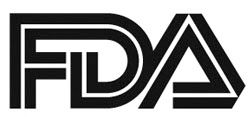FDA Grants Fast Track Designation for Tipifarnib In Patients with HNSCC
The FDA has granted a Fast Track Designation to tipifarnib, a farnesyl transferase inhibitor, for the treatment of patients with <em>HRAS</em>-mutant head and neck squamous cell carcinomas who have previously progressed on platinum therapy, according to a press release from Kura Oncology.

The FDA has granted a Fast Track Designation to tipifarnib, a farnesyl transferase (FTase) inhibitor, for the treatment of patients withHRAS-mutant head and neck squamous cell carcinomas (HNSCC) who have previously progressed on platinum therapy, according to a press release from Kura Oncology.1
Preliminary results of the phase II trial of tipifarnib (AIM-HN, NCT02383927) in this patient population were presented at the AACR-NCI-EORTC International Conference on Molecular Targets and Cancer Therapeutics. The responses observed included 10 objective responses (56%; 95% CI, 0.31-0.78) and there were 8 cases of stable disease (SD). The median progression-free survival (PFS) for patients who acheeived a reponse was 8.4 months compraed with 4.5 month in those who had SD.2
“We are very encouraged by our growing body of clinical data for tipifarnib inHRAS-mutant HNSCC and believe that the FDA’s Fast Track designation puts us one step closer to delivering a precision medicine treatment for patients with this devastating disease,” said Antonio Gualberto, MD, PhD, head of Development and Chief Medical Officer of Kura Oncology. “We continue to work with regulatory authorities in the U.S. and abroad in our effort to bring tipifarnib to patients as quickly as possible.”
In the study, all patients experienced at least 1 treatment-emergent adverse event (TEAE). The most frequent TEAEs greater than grade 3 that occurred in at least 10% or more of patients included were blood and lymphatic system disorders, gastrointestinal disorders, and renal disorders.
Overall, the study investigators found the results to be encouraging for patients withHRAS-mutant HNSCC. A pivotal study was launched following these results to evaluate the efficacy of tipifarnib and assess its impact as first-line treatment forHRAS-mutant HNSCC.
The phase II study of tipifarnib in advanced non-hematological malignancies withHRASmutations investigated antitumor activity in 3 nonrandomized cohorts of patients. Aside from the HNSCC cohort, patients withHRAS-mutant malignant thyroid tumors and squamous cell carcinoma withHRASmutation were enrolled. These patients were primarily evaluated for ORR. The study also looked at secondary end points, which included OS, duration of response, and the number of subjects with adverse events.
To be eligible to enroll, patients were required to have a histologically or cytologically confirmed diagnosis of thyroid cancer, HNSCC, or another squamous cell carcinoma head and neck cancer. These patients required an ECOG performance status of 0 or 1, acceptable liver function, acceptable renal function, and an acceptable hematologic status.
Those excluded from the trial were patients with known uncontrolled brain, leptomeningeal or epidural metastases, history of coronary heart disease infraction, non-tolerable neuropathy or unstable neurological symptoms of grade 2 or higher, and those with active uncontrolled bacterial, viral, or fungal infections. The study also excluded those who had prior treatment with an FTase inhibitor.
The phase II tipifarnib study is ongoing with a target completion date of October 2020. Patients are actively being screened for enrollment in the study.
“Although we experienced some delays in site activation, we’re encouraged to have the vast majority of the participating sites now open, with a corresponding increase in the rate of screening,” said Kathleen Ford, chief operating officer of Kura Oncology. “We recently presented impressive data from our Phase 2 trial in the same patient population and we believe that awareness of these data will continue to increaseHRAS-mutation testing and enrollment. Enrollment in AIM-HN remains our top priority and we remain steadfast in our commitment to bring tipifarnib to patients withHRAS-mutant HNSCC for whom no treatment options are specifically indicated.”
References
- Kura Oncology Receives Fast Track Designation for Tipifarnib in HRAS Mutant HNSCC and Provides Enrollment Guidance for AIM-HN Trial [press release]. San Diego, California: Kura Oncology, Inc; December 16, 2019.https://bit.ly/2RYCvKp. Accessed December 17, 2019.
- Ho A, Brana I, Haddard R, et al. Preliminary results from a phase 2 trial of tipifarnib in squamous cell carcinomas (SCCs) with HRAS mutations. Presented at the AACR-NCI-EORTC International Conference on Molecular Targets and Cancer Therapeutics; October 26-30, 2019; Boston, Massachusetts. Abstract PR08.